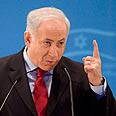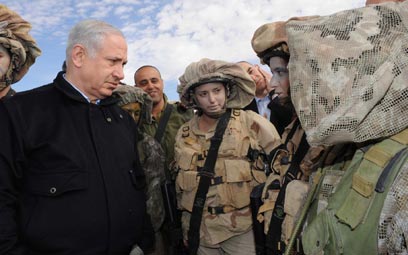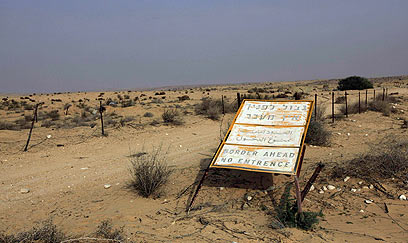
Israel fears terrorist-refugees may set up Qaeda cells
During tour of Israel-Egypt border, IDF officials tell Netanyahu terror group may recruit Sudanese refugees, have them infiltrate Israel
Prime Minister Benjamin Netanyahu on Thursday toured the Israel-Egypt border and received a briefing on the recent infiltration problem in the area. According to IDF officers, some 800-1,000 people have infiltrated the border in the past month alone. Most infiltrators hail from Africa, and a few others come all the way from Turkey, they said.
The IDF officers told Netanyahu that al-Qaeda and its offshoots may attempt to send Sudanese refugees across the Egyptian border and into Israel with the aim of setting up terror cells in the Jewish state.
A senior military official told the PM that the terror group may attempt to recruit people in Sudan and train them. Al-Qaeda will then have the recruits infiltrate Israel, set up terror cells and recruit other refugees to carry out attacks in Israel, according to the army official.
Netanyahu was told that the past four years have seen 20 attempts by terrorists to infiltrate Israel through the breached Egyptian border.
During a recent incident, IDF forces apprehended a lone infiltrator carrying a five-kilo (11 pounds) explosives device. The security establishment estimates that the terrorist either planned to carry out the attack himself or transfer the device to Palestinian terrorists.
Southern Command chief Major-General Yoav Galant told the prime minister that it was not essential to erect a security fence in the mountainous areas near Eilat, but Netanyahu insisted it was necessary.
Based on recent findings, Netanyahu noted that the infiltrators pose an immediate threat to Israeli society. "Infiltrators cause cultural, social and economic damage, and pull us towards the Third World," the prime minister said at a Manufacturers Association assembly earlier in the day..
Prime Minister's Office Director-General Eyal Gabai noted at the end of the tour that the government still intends on building the fence in Eilat, despite the military's opposition. Gabai explained that the decision was based on the proximity of the fence to the city and the mountainous surrounding area that allows for relatively easy infiltrations.
Deputy IDF Chief Major-General Benny Gantz also participated in the patrol, which was held on a Yasur chopper. As part of the briefing, the prime minister was presented with an array of tools used by infiltrators, along with IDF methods to thwart them.

Intensive IDF operations impede infiltrations (Photo:AP)
24 hours, 24 infiltrators
In the past 24 hours alone, 24 infiltrators were intercepted near the border. The area commander, Brigadier-General A said that a Bedouin smuggler made some $2,000 for every person he managed to smuggle across the border into Israel: "It is an alarming phenomenon of human trafficking, which stems from criminal and economic reasons," said A.
According to A, the only thing that helps thwart the countless infiltrations is the intensive military operations in the area.
Netanyahu said he was aware of some of the data concerning the terror threats, and that these were raising his concerns even more. He said he plans on speeding up the construction of the fence, and will bring it up for discussion at the Knesset plenum in two and a half weeks.

Barrier can be ready in two to three years (Photo: AP)
The PM estimated that the completion of the fence will take two to three years and will cost around NIS 1.35 billion ($360 million).
During the briefing, Netanyahu was also told that the breached border with Egypt was used for intensive narcotics smuggling, estimated at 160 kg (about 353 pounds) of heroin and 1.3 tons of Hashish in the past year. Other items often smuggled through the border include cigarettes, whose lost tax revenue is estimated at some NIS 10 million per year.
While visiting the fence on the Gaza side, IDF officers told the PM about the Egyptian soldiers who often shoot at infiltrators. "The Egyptians shoot at everything, sometimes even at us. We must coordinate with their authorities so that they leave the infiltrators alone and don't kill them. The infiltrators run towards us with hands in the air because they know it's safe here," said one of the officers.
The issue of the security fence was raised during the last meeting between Netanyahu and Egyptian President Hosni Mubarak. Egypt knows that if and such a fence is constructed, it will be forced to handle the infiltrators on its own.










